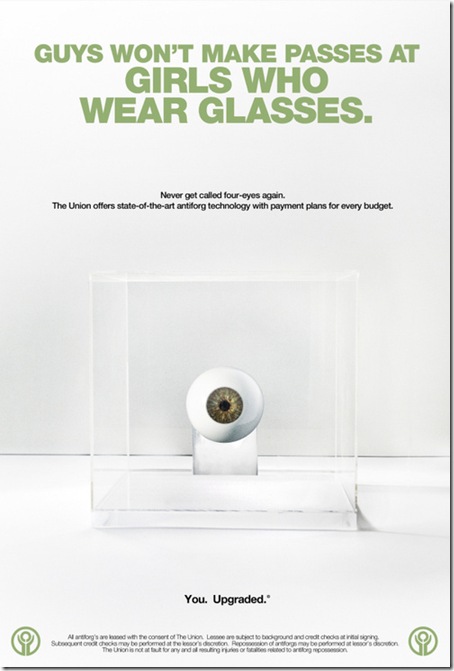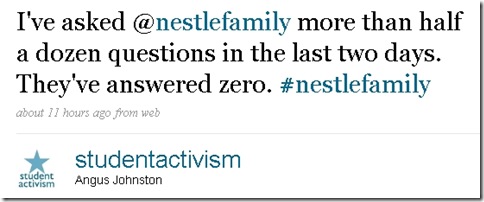Home » advertising (Page 6)
Category Archives: advertising
Digital Culture Links: April 19th 2010
Links for April 19th 2010:
- Why the Library of Congress cares about archiving our tweets [Ars Technica] – Interesting look at the motivations behind the US Library of Congress twitter archive – and their perspective on how Twitter has changed communication – and why Facebook hasn’t. Some of the challenges the Library of Congress archive will face are important issues for researchers, including dealing with shortened urls through third parties such as bit.ly and tinyurl; and whether or not to archive photos on twitter specific photos (eg twitpic) – this one seems unlikely.
- Twitter Chirp Conference – Videos [Justin.tv ] – A video archive of Twitter’s first official conference – Chirp – in April 2010.
- Facebook Ads Will Use Your Web History [Mashable] – “Facebook will soon use your activity on other web pages to target ads based on your interests, Financial Times reports. That’s potentially a big boon for advertisers, but it won’t sit well with privacy advocates. Note that Facebook already targets ads using information from your profile, and this new system will not track all of your browsing. Rather, Facebook will offer sharing buttons to interested websites. Readers will be able to click on them to share the links with their Facebook friends via Facebook Connect […] Once the user shares a link with his friends, Facebook will assume that person shared it because he or she liked it, so the company will include content from that web page in the data it uses to target ads based on user interest. The ads will appear whenever the user visits the Facebook website.”
- Internet dating [SMH] – “Australians are changing the way they date and mate, a survey shows. A Nielsen poll found one in four adults have used the internet to find a partner and another 38 per cent are considering using online dating. The other 37 per cent – many presumably in relationships – said they would never go online to meet someone. Of those who had used online dating, 33.6 per cent reported a short-term relationship, 16.2 per cent said they had a long-term relationship, 8.9 per cent said they had married or were in a defacto relationship, and 2.7 per cent had children. […] The survey shows that:
* Of those who had used online dating, 62 per cent had dated someone they met online;
* Men were slightly more likely than women to use online dating services; and
* Most of those polled (72 per cent) were seeking a serious relationship, but many were looking for friendship or just sex.
Nielsen polled 3057 people online in November and 3764 in January, with the data weighted to the general population.”
Digital Culture Links: March 25th 2010
Links for March 25th 2010:
- The bosses who snoop on Facebook | Maxine Frances Roper [The Guardian] – I’m not sure I agree with this article, but the tensions between public and private spaces versus public and private as a technological setting are well articulated: “The practice of employers running internet searches on employees is now so widespread that employment agencies offer advice on “online reputation management”. As one such site puts it: “Even a family recipe for picked gherkins can influence an employer’s opinion of you.” But just because it’s possible for employers to unearth background information that once would have been the preserve of the most diligent East German spy, does that mean they should? There is a common belief that people who share information online are deliberately seeking attention, and therefore have it coming. Yet thinking that anyone with an online presence is out for publicity is as boneheaded as the idea that anyone who dresses up nicely is out to have indiscriminate sex.”
- How the internet will turn the world upside down [mUmBRELLA] – The *very* near future: “Talk about demonstrating the scary power of the internet. In this near-future science fiction story, blogger Tom Scott shares a scenario that could very easily become a reality. It centres around how one short video clip uploaded onto the web spreads across the world like wildfire. It results in a flash mob, which turns into a riot and then ultimately, several deaths. Now, keep in mind this is not a real story. But the incidences Scott mentions in his story have all occurred – just not at the same time. At least not yet.”
(This clip would give Cory Doctorow a run for this money.) - Nestle’s Facebook meltdown [Thought Gadgets] – A Nestle public relations disaster using social media. A good how NOT to guide.
- Social Networking Rants Against Exes Turning Up In Court [Techdirt] – Another reminder that the web never forgets: “For many people, it’s natural to treat social networking platforms as being the equivalent of just talking — rather than being any sort of formal written communication. Of course, the big difference is that everything you type can be accurately saved forever — and, potentially, used against you in court. Obviously what people say out loud can also be used in court, but in an argument between, say, a broken up couple, a yelling fight just becomes a screaming match. In the social networking world, it can become evidence. Two recent stories highlight this. The first, from Eric Goldman, is the “disturbingly humorous” transcript from the court concerning a blog post about a woman’s ex-husband …”
RepoMen
While I fear the upcoming film RepoMen is unlikely to live up the the dystopian promise of its premise (the repossession of artificial organs from people who’ve defaulted on their repayments in a not-too-distant-future), I love some of their promotional posters …
Digital Culture Links: January 13th 2010
Rather Google-centric links January 13th 2010:
- Google ‘may end China operations over Gmail breaches’ [BBC News] – “Internet search company Google says it may end operations in China over alleged breaches of the e-mail accounts of Chinese human rights activists. It said it had found a “sophisticated and targeted attack on our corporate infrastructure originating from China”. It did not specifically accuse China’s government but said it was no longer willing to censor its Chinese site’s results, as the government requires. Google said the decision may mean it has to shut the site, set up in 2006.” Google’s certainly showing some real guts; read their official statement.
- Google finally enters the online storage arena with a free 1GB [Technology | guardian.co.uk] – With the announcement that Google are now supporting online file storage of any file-type via Google Docs the fabled GDrive appears one step closer! Jack Schofield examines Google’s online storage foray: “First, as Google says, you will be able to share files that Google Docs can’t handle, presumably including avi and MP3. That is clearly useful. Second, Google Docs can be a problem for companies sharing Microsoft Office files, because the features you lose when you convert to Google’s formats you can never get back. Google Docs storage will now let people share those files. And third…. Google is planning to launch ChromeOS, where computers run a Chrome browser but have no permanent local storage: everything is done “in the cloud”. Google probably does not plan to tell those folks to go somewhere else to store their files, so at that point it will need an online storage offering.”
- Uni staff migrate to the cloud [The Australian] – “More universities are set to follow Macquarie and outsource staff email to parties such as Google’s Gmail, with Curtin University close to a deal with Microsoft. About 14 Australian universities have already outsourced their student email to Gmail or Microsoft’s Live@edu service, but this week Macquarie became the first to migrate staff to the so-called cloud in a deal with Gmail. The cloud is jargon for the outsourcing of email and data services to external providers that host the data on servers that can be located across the world. Concerns about the security of intellectual property and academic privacy had made universities cautious about moving staff to the cloud. But Macquarie’s chief information officer Marc Bailey said the likes of Google and Microsoft offered vastly superior security to a university.” (Given how frustrating current arrangements can be, I welcome a cloud-based email system for Curtin staff!)
- Google Plans to Upgrade Old Billboards in Street View [RW Web] – Google’s street view becomes a virtual advertising landscape! Inspired by Minority Report perhaps? “According to a new patent that was just granted to Google, the company could soon extend the reach of its advertising program in Google Maps to Street View. This patent, which was originally filed on July 7, 2008, describes a new system for promoting ads in online mapping applications. In this patent, Google describes how it plans to identify buildings, posters, signs and billboards in these images and give advertisers the ability to replace these images with more up-to-date ads. In addition, Google also seems to plan an advertising auction for unclaimed properties. In Google’s example, the software could identify the marquis and individual window posters on a theater property and replace them with new information. Through this, a theater could promote a new play in Street View, even if the actual Street View image is completely out of date.”
Digital Culture Links: December 2nd 2009
Links for November 27th 2009 through December 2nd 2009:
- Seven’s FlashForward “leaked” to US [TV Tonight] – “Monday night’s episode of FlashForward was the last for the year on Seven, and screened before the US which took a broadcast break for Thanksgiving. That resulted in the episode being uploaded as a torrent and now “leaked” to America. The Hollywood Reporter notes that “Australians don’t care about our guilt-tinged empire-expanding holiday traditions and didn’t take a break. Whether the US-Aussie FlashForward schedule being jolted out-of-sync will result in future episodes also being leaked isn’t known.” Presumably the episode will be downloaded across the US complete with a Channel 7 watermark. It’s all rather ironic given Disney / ABC went to great lengths to make sure Aussie media didn’t reveal information on the series in the lead-up to the premiere, insisting they attend a cinema screening and sign confidentiality clauses.” (US viewers, welcome to the other side of the tyranny of digital distance!)
- The hits on iView [TV Tonight] – “Four Corners, United States of Tara, Good Game, Doctor Who, The Chaser’s War on Everything and Media Watch are the most popular titles on the ABC’s iView platform. The online catch-up service has been operating since July 2008. Since April this year there have been 6.2 million views of programs with an annual monthly average of 610,000 visits, up by 140% compared to last year. It averages 206,000 visitors per month, up by 60% compared to last year. In October 2009, ABC iView recorded its highest ever number of visitors and visits. 286,000 visitors and 1.054 million visits to ABC iView.” (Finally, streaming timeshifted TV is making solid inroads in Australia.)
- Moviegoers 2010 available for download [Marketing Strategy for Entertainment and Brand Clients – Stradella Road] – “Why does movie studio tracking and research so often surprise and disappoint us? The answer experienced movie marketers gave us in private conversations was this: We still don’t know our customers/audience as well as we should.
Where do moviegoers really spend their time? What are the social dynamics of the decision-making process? How do we synthesize the sea changes taking place with digital technologies in order to reach the right audience with the right message at the right time in the right place? We designed the Moviegoers 2010 research study to answer these questions […]
• Moviegoers spend more time each week online (19.8 hours) than they do watching TV (14.3 hours)
• 52% of moviegoers have digital video recorders (61% of the 30-39 demo) and, of those consumers, 71% fast-forward to skip commercials.
[Download the full report – PDF] - Westfield Facebook application draws fire [mUmBRELLA] – Westfield has drawn criticism over a Facebook application that may be in breach of the social networking site’s terms and conditions, despite the two companies collaborating to develop it. The application updates a user’s status with a Westfield-branded message to promote its Gift Card. It requires the user to opt in so that their status is updated to “All I Want for Christmas is a Westfield Gift Card”, with extra copy stating that the user has now gone into the draw to win a $10,000 gift card. […] But the promotion has also attracted a backlash from other users, complaining that the promotion is taking over the social networking site as friends’ status updates that feature the Westfield branding, clutter their screens. Facebook groups have also been created in opposition to it. One group, known as If All You Want For Christmas Is A Westfield Gift Card, I Don’t Want To Know, currently has over 3,300 fans.” (Spam as a Facebook App … great marketing!)
VegeSmite? Some quick thoughts on #vegefail & #nestlefamily
Twitter hastags are quickly becoming the popular shorthand to express corporate disasters with social media. Two cases in point recently: #vegefail, the dramatic, vitriolic and 100% negative response to Kraft naming a new Vegemite and Cheese product ‘iSnack 2.0’ after opening to public suggestions, and #nestlefamily in which the many, many questionable practices for Nestle regarding infant formula, and other things, resurfaced as the company courted influential ‘mummybloggers’ (a shorthand which, I gather, should really be ‘parent bloggers’ since some dads blog in this fashion, too).
First, Kraft: while having a national competition to name the new Vegemite product actually seemed a great way to harness Aussie love for all things Vegemite, especially when you receive more than 50,000 suggestions, letting Kraft simply pick a winner from all those suggestions was not such a good plan, especially when they picked ‘iSnack 2.0’ (which might be a good name for Steve Jobs’ new toaster, but not for an Australia food icon). Since the announcement last Saturday, there has been complaints, loud, angry, and funny (see one person’s response Downfall meme style! and the satirical iSnack 2.0 Twitter stream) but at the same time, the love for Vegemite was the most thing most central in these responses. All the complaints may have looked like a massive marketing fail (hence #vegefail) yet Kraft have announced today (a mere 6 days later) that they’re going back to the drawing boards and getting another new name:
In the end, though, I tend to agree that the iSnack 2.0 reaction was far from a PR disaster – whether planned from the beginning, or a clever reaction to overwhelming customer sentiment, in going back to their consumers and letting them vote once again (albeit from six safe and crappy names) Kraft both reminded most Australians how much they care about Vegemite and got more publicity for a new product than you could possibly generate with a traditional advertising campaign. (And despite the cynicism, yes, I’ve voted.)
By contrast, the recent #nestlefamily controversy erupted when Nestle attempted to court influential ‘mummybloggers’ in the US by inviting 20 or so of them to a paid retreat where Nestle could show off their latest products and get authentic mummyblogger feedback. However, Nestle seemed to give no thought at all to what openly courting social media attention might actually mean. On hearing about the planned event, and noting that some of the attendees were people she respected, PhD in Parenting wrote a long post entitled ‘An open letter to the attendees of the Nestle Family blogger event’ which reminded a lot of people about the many issues with Nestle as a company, including their long history of unethical behaviour, especially in relation to infant products, most notably, of course, being pushing infant formula in Africa. Needless to say, before the event even started, a massive debate began on Twitter between supporters and detractors of Nestle; the oddest thing, though, was the deafening silence from Nestle. For most of the debate, they remained silent and let people rage on blogs and Twitter. In leaving others to defend Nestle, some of the most angry defenders have clearly done more harm than good. I don’t have time to go too far into the details, but I recommend reading the summary by Crunchy Domestic Goddess which gives an even-handed overview of the guts of the debate in terms of the way social media has been used.
Then, in a last ditch effort, Nestle have officially joined Twitter to try and manage the #nestlefamily debates, but they still don’t understand that this is a conversation, not a PR engine. At the end of the day, this tweet seems to sum up perfectly why Nestle just don’t get social media:
Of course, now that questions are being asked loudly, if Nestle doesn’t answer them, others will.
The difference between Nestle and Kraft is simple: at the end of the day, Kraft listened and that was their salvation. Nestle could learn from their corporate cousin.




